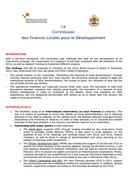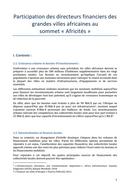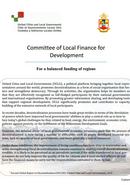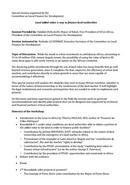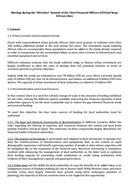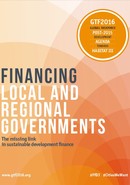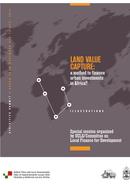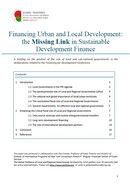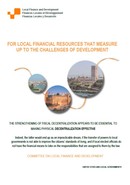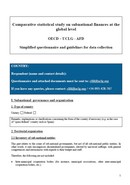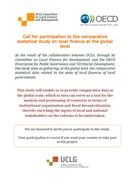Chair: Fathallah Oualalou, Mayor of Rabat, Morocco
Contact: Nathalie Le Denmat
Fiscal decentralisation is not measuring up to its challenges
Great progress has been seen in decentralisation processes in recent decades in terms of the devolution of power, placing local governments at the heart of contemporary global challenges that affect most countries, such as food, energy, environmental and financial crises, and the fight to end poverty.
However, the various studies carried out on local finances, notably the GOLD II report, show that these processes are now faced with many difficulties: poorly developed fiscal systems, a lack of financial autonomy, the insufficient capacities of local governments, and the inadequacy of resources in general.
Similarly, studies conducted within the framework of the Millennium Development Goals show that the low achievement level of the MDGs remains strongly linked to the lack of funding granted by central governments to local governments and the impossibility for local governments to raise external funding, even though the skills related to basic services are largely devolved to local authorities.
Under these conditions, the improvement in living conditions for citizens is slow to materialise and the strengthening of fiscal decentralisation proves to be essential in order to make decentralisation credible. Indeed, there is a high risk of decentralisation being perceived as an unattainable dream if the transfer of powers to local governments does not result in an improvement in the quality of life of citizens and if local elected officials do not have the financial means to allow them to assume the responsibilities entrusted to them by law.
Promoting balanced financing of local governments
Local finances, essential to the implementation of the various local public policies, are, in fact, at the heart of the debate on decentralisation, local autonomy and applying the principle of subsidiarity.
Chaired by the city of Rabat in Morocco since 2009, the Committee on Local Finance and Development (CFLD) has the mandate of encouraging the exchange of information and experience in the key areas of fiscal decentralisation:
- Is the sharing of national revenue among the different levels of government carried out fairly? Is the transfer of powers actually accompanied by the corresponding resources?
- Do the methods of distributing taxes allow authorities to have sufficient revenue at their disposal, in accordance with the principle of subsidiarity?
- What capacity do local governments of today have to generate their own income, access loans or create public-private partnerships?
In association with its financial and technical partners, CFLD organises its activities around several axes: the facilitation of a network of experts in local finance, the organisation of a global observatory project on local finances, and advocating for the financing of local governments and for fiscal decentralisation.
Facilitating a network of experts in local finance
In order to support this advocacy, UCLG relies on a network of experts in local finance in which Financial Managers from local authorities hold a privileged position. Evaluating the strengths and weaknesses of the fiscal systems in which they exercise their responsibilities on a daily basis and advising local elected officials on fiscal policy, these professionals indeed have the expertise and analytical skills that are invaluable to fuelling the debate.
Such a network is emerging on the African continent in particular, under the auspices of UCLG Africa and the UCLG Committee on Local Finances for Development (CFLD). A platform for exchanging experiences and knowledge, this network unites Financial Managers around an observatory project on local finance, strengthening the approaches of assessment and innovation, and facilitating the development of frames of reference and analyses specific to guiding elected officials in the implementation of their fiscal policies.
This network aims to expand gradually to other world regions, notably to Latin America and Europe in 2014.
Developing an observatory project on local finance
To better bring the issues of fiscal decentralisation to both the national and international stages, and to be able to propose financing approaches adapted to the needs of their populations, local governments must have the tool of knowledge regarding their local finances at their disposal.
However, data that allows the realisation of accurate analyses, highlighting the strengths and weaknesses of different systems of local finance, the level of financial autonomy of local governments, their borrowing capacity, etc. is rarely available, since data collection is not always systematised and the means for implementing effective information systems are lacking. Moreover, aggregated global data that is currently available does not allow for the assessment of the whole reality of systems of fiscal decentralisation.
In this context, the creation of a global observatory on local finances is one of the tools that UCLG wishes to adopt in order to support its members in their dialogues with central governments. Recommendations were put forward in this respect in 2007, and from 2008, a call was launched for the creation of a tool to gather financial data from local governments, involving local and central governments, associations of local authorities and sponsors, with the aim of making available independent and reliable information on local finances.
A pre-feasibility study was conducted in 2013 and a testing phase is currently ongoing in Africa, led by UCLGA. The feasibility phase of the project and its extension to other UCLG Sections are part of the CFLD programme for 2014-2016.
Advocating for fiscal decentralisation
The alarming state of local finances in most countries means that the sustainable development goal for regions cannot be achieved. Many components of local finance mechanisms do not exist, are incomplete, or have been put into place without taking into account institutional contexts.
"Some states do not seem to understand that they must create an environment conducive to the action of local governments. Rather, the trend towards recentralisation in some countries seems to have been exacerbated by the impact of the global economic and financial crisis."
- Which obstacles impede fiscal decentralisation? Why are the recommendations of the international community so rarely acted upon?
- How can central governments be convinced of the potential for growth and development that well-equipped cities represent? How can we demonstrate that the "price to pay" to achieve this is much lower than the cost of a laissez-faire policy, in the long run?
- How can a sufficient part of the wealth created in order to respond to the needs of investing in urban areas be mobilised? Which fiscal reforms would allow for better mobilisation of national and local resources?
- What level of financial autonomy are local governments really allowed to adapt national policies to the realities and needs of their regions?
- Which mechanisms should be promoted in order to facilitate borrowing and public-private partnerships? How should the structuring of markets, as well as securing them, be supported, and goods adapted to the needs and capacities of local governments?
- How can mechanisms for financing investments be elaborated through value creation in land development?
These are all questions that the UCLG Committee on Local Finance for Development tries to answer through the various international forums in which it participates, as well as through its preparations for the Habitat III Conference.
Documents
-
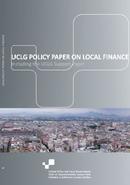 UCLG Policy Paper on Local Finance
Read
UCLG Policy Paper on Local Finance
Read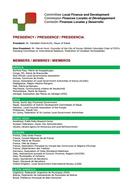 Members
Read
Members
Read Summary of committees and working groups activities and 2007-2010
Read
Summary of committees and working groups activities and 2007-2010
Read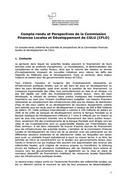 ompte-rendu et Perspectives de la Commission Finances Locales et Développement de CGLU (CFLD) available in French
Read
ompte-rendu et Perspectives de la Commission Finances Locales et Développement de CGLU (CFLD) available in French
Read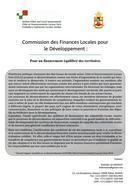 Commission'des'Finances'Locales ( available in French)
> <
Commission'des'Finances'Locales ( available in French)
> <-
 Circular 1: São Paulo City Hall Secretariat for International Affairs
Read
Circular 1: São Paulo City Hall Secretariat for International Affairs
Read Circular 2: Local Finance Committee - First Meeting February 10th 2006
Read
Circular 2: Local Finance Committee - First Meeting February 10th 2006
Read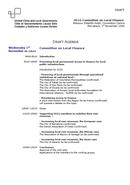 Read
Read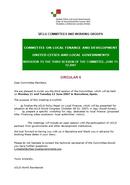 Circular 6: Barcelona Meeting Invitation
Read
Circular 6: Barcelona Meeting Invitation
Read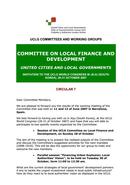 Circular 7: Invitation to the UCLG World Congress in Jeju
Read
Circular 7: Invitation to the UCLG World Congress in Jeju
Read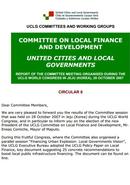 Circular 8: Report of the Committee meeting organised during the UCLG World Congress in Jeju
Read
Circular 8: Report of the Committee meeting organised during the UCLG World Congress in Jeju
Read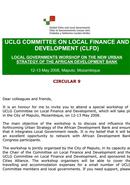 Circular 9: local governments worshop on the new urban strategy of the African Development Bank
Read
Circular 9: local governments worshop on the new urban strategy of the African Development Bank
Read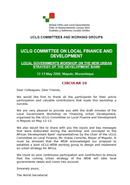 Circular 10: Local Governments worshop on the new urban strategy of the Development Bank
Read
Circular 10: Local Governments worshop on the new urban strategy of the Development Bank
Read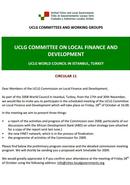 Cicular 11: UCLG World Council in Istanbul, Turkey
Read
Cicular 11: UCLG World Council in Istanbul, Turkey
Read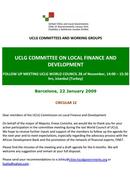 Circular 12: Follow up meeting UCLG World Council in Istambul
Read
Circular 12: Follow up meeting UCLG World Council in Istambul
Read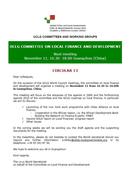 Circular 13: Next meeting November 11, Guangzhou (China)
Read
Circular 13: Next meeting November 11, Guangzhou (China)
Read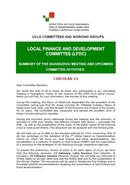 Circular 14: Summary of the Guangzhou meeting and upcoming Committee activities
Read
Circular 14: Summary of the Guangzhou meeting and upcoming Committee activities
Read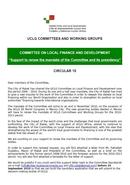 Circular 15:“Support to renew the mandate of the Committee and its presidency”
Read
Circular 15:“Support to renew the mandate of the Committee and its presidency”
Read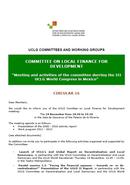 Circular 16: “Meeting and activities of the committee durring the III UCLG World Congress in Mexico”
Read
Circular 16: “Meeting and activities of the committee durring the III UCLG World Congress in Mexico”
Read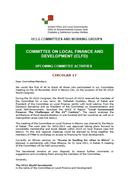 Circular 17: Upcoming Committee Activities
Read
Circular 17: Upcoming Committee Activities
Read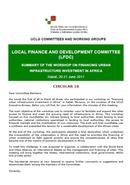 Circular 18 Summary of the worshop on financing urban infrastructure investment in Africa
Read
Circular 18 Summary of the worshop on financing urban infrastructure investment in Africa
Read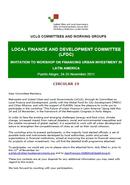 Circular 19: Invitation to worshop on financing urban investment in Latin America
Read
Circular 19: Invitation to worshop on financing urban investment in Latin America
Read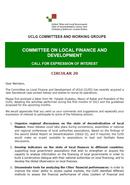 Circular 20: Call for expression of interest
Read
Circular 20: Call for expression of interest
Read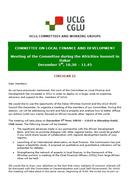 Circular 21: Meeting of the Committee during the Africities Summit in Dakar
Read
Circular 21: Meeting of the Committee during the Africities Summit in Dakar
Read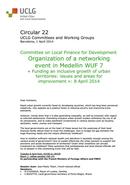 Circular 22: Committee on Local Finance for Development Organization of a networking event in Medellin WUF 7
> <
Circular 22: Committee on Local Finance for Development Organization of a networking event in Medellin WUF 7
> <











